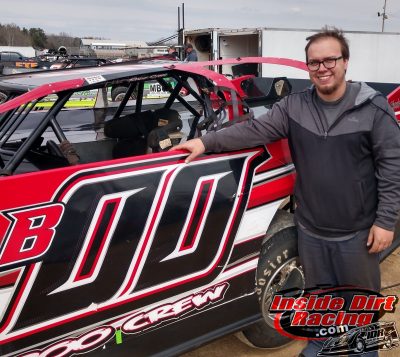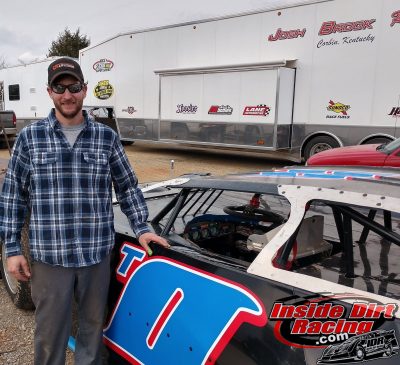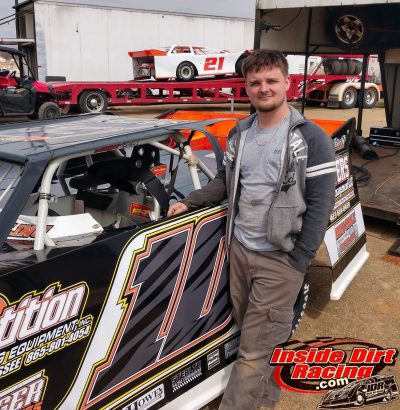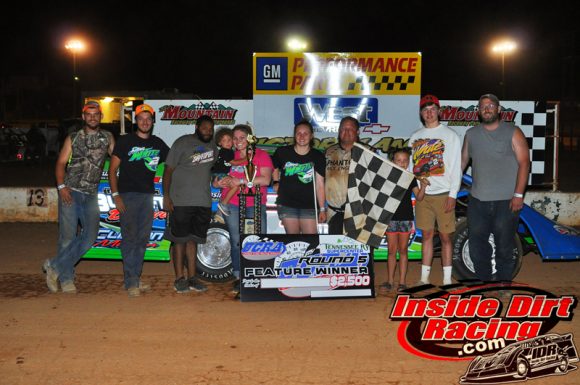This past weekend marked the beginning of the points-paying weekly racing schedule for east Tennessee tracks when Volunteer Speedway in Bulls Gap, Tenn. swung its gates open for competition in six divisions. In the coming weeks, a number of other facilities will follow suit with passionate racers working on cars and sitting behind the wheels of powerful machines. Tazewell Speedway, I-75 Raceway, Crossville Speedway, Wartburg Speedway and 411 Motor Speedway are among those venues in east Tennessee that join Volunteer in running on a regular basis.
With no promise of future riches and certainly not the level of fame experienced by those who compete at the national level in the Lucas Oil Late Model Dirt Series and World of Outlaws Late Model Series, these racers often ply their trade on the same track week after week. As a result, these competitors are often referred to as the backbone of the sport and many think of these local stars as a primary reason for the sport’s survival.
In a recent Twitter post, former driver, racing promoter, and radio co-host Chris Corum declared, “Short tracks are the foundation of the whole sport and ‘support’ classes are the foundation of the short tracks.” Few enthusiasts of short track racing in general, and dirt track racing in particular, would argue with Corum’s statement.
Weekly racers Josh Henry, Travis Fultz, Bradley Lewelling and Anthony White recently offered their thoughts to InsideDirtRacing.com on why weekly racers continue to do what they do despite the amount of time required to work on their cars and the expense incurred while doing so just to race for a few laps each week.
“It’s just the love of doing it,” Henry explained. “It keeps all of my family together- my wife, my dad, and my mom. Everybody gets to come and enjoy the family time together. I just really enjoy racing. I wouldn’t really imagine doing anything else.”
According to Henry, half-hearted efforts won’t suffice for the weekly racer.
“You’ve either got to be all in or all out, honestly,” he continued. “You ain’t getting rich, but if you don’t take it seriously, you might as well stay at home.”
Fultz adds that the lure of high-speed competition serves as a draw for him. And more, the desire to win keeps him coming back time after time.
“It’s mostly the thrill of the speed and the race,” Fultz insisted. “I guess our competitive nature would be the main thing. No matter what I’m driving, whether it’s my car or someone else’s, I still want to win.”
And Fultz re-emphasizes the fact that finances are often an issue for the weekly campaigner. Further, he points out that a love for mechanical things is vital for those who participate in racing.
“I could win every race this year and I might break even,” the Sportsman regular added. “There’s just something about it that gets inside of you and drives you. If you don’t like working on cars, you don’t need to have a race car.”
Lewelling echoes the thoughts of his counterparts and adds that the sport gets into the blood of all those involved.
“Racing is like a drug to me,” Lewelling said. “You just can’t quit. It just never goes away. It kills you not to run every week. And when you run second or third and you know you’ve got good equipment, you’re just trying to get it to the max speed you can get it to. The car is capable of doing it, you just want to get it to that point.”
Further, the amount of work required can be excessive.
“Yeah, overtime plays a big part in doing this,” Lewelling continued.
White is a long-time racer who has experienced the thrill of victory on numerous occasions but also knows the cost of his passion. The never ending hours spent in the shop seem to pale in comparison to the relatively short amount of time on the track. But that love for the sport fuels his desire to keep coming back.
“I just like spending my time at the race track,” White offered. “I’ve been doing it for quite some time. I just like driving the cars is the biggest thing. The work is the worst part of it, and the expense. As far as driving the car, I do it to unwind. I work on my car in the evening and I wouldn’t know what to do with myself if I wasn’t doing this since I’ve been doing it for so long.”
White says the weekly racer has to be tough, passionate, resourceful and dedicated.
“If you don’t love it, you shouldn’t be in this sport because it ain’t for the weak at heart. A lot of people won’t do the work you have to do just to come out here and race for the 30 minutes you might be on the track. It’s crazy to think about the work we put in it for just 30 minutes on the track.”









